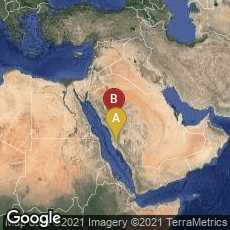

A: An Naseem, Makkah, Makkah Province, Saudi Arabia, B: Saudi Arabia, الزهرة, المدينة المنورة, منطقة المدينة
Between 650 and 656 the third Caliph Uthman ibn Affan caused the text of the Qur'an (Koran) to be codified. He placed Zayd ibn Thabit (Zaid Ibn Thabit), the personal scribe of Prophet Muhammad, in charge of the project. Identifical copies were sent to every Muslim province to be used as the standard text from which all copies of the Qur'an were made.
"During the time of Uthman, by which time Islam had spread far and wide, differences in reading the Quran in different dialects of Arabic language became obvious. A group of companions, headed by Hudhayfah ibn al-Yaman, who was then stationed in Iraq, came to Uthman and urged him to 'save the Muslim ummah before they differ about the Quran' . Uthman obtained the complete manuscript of the Qur'an from Hafsah, one of the wives of the Islamic prophet Muhammad who had been entrusted to keep the manuscript ever since the Qur'an was comprehensively compiled by the first Caliph, Abu Bakr. Uthman then again summoned the leading compiling authority, Zayd ibn Thabit, and some other companions to make copies of the manuscript. Zayd was put in charge of the task. The style of Arabic dialect used was that of the Quraysh tribe to which the Prophet Muhammad belonged. Hence this style was emphasized over all others.
"Zayd and his assistants produced several copies of the manuscript of the Qur'an. One of each was sent to every Muslim province with the order that all other Quranic materials, whether fragmentary or complete copies, be destroyed. As such, when the standard copies were made widely available to the Muslim community everywhere, then all other material was burnt voluntarily by the Muslim community themselves. The annihilation of these extra-Qur'anic documents remained essential in order to eradicate scriptural incongruities, contradictions of consequence or differences in the dialect from the customary text of the Qur'an. The Caliph Uthman kept a copy for himself and returned the original manuscript to Hafsah" (Wikipedia article on Uthman ibn Affan, accessed 01-14-2012).